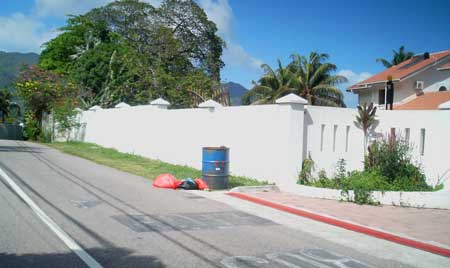


An environment police unit comprising eight inspectors who will be out and about in Victoria and in the districts talking to members of the community on laws against littering. The announcement was made by the new Minister of the Environment, Natural Resources and Transport Joel Morgan.
Minister Morgan made the announcement in person to the state broadcasting media last Wednesday. He said that the initiative was the “latest stage in the campaign to educate the community of the impact littering has on the environment.” In practice no one will experience any education, for the “inspectors” will have the power to fine you on the spot.
“We need to stop and think of the consequences of our actions and the impact it has on our environment. The Ministry will be policing public places where take-away boxes, juice packets and PET bottles are dumped all over the place. We will also look at the disposal of large items such as bags of rubbish that are carelessly dumped on the roads, beaches and other public area,” the Minister was quoted as saying by the State controlled Seychelles Nation.
Morgan said that the environment police inspectors will issue those caught littering with an on-the-spot fine of R200.00, adding that offenders can be further prosecuted in a court that will be especially established to deal with environment and traffic related offences. Since, under the Constitution, the responsibility to establish any court rests with the Chief Justice as head of the Judiciary, it remains to be seen if Morgan’s kangaroo court will have any authority to send anyone to prison.
Although the unit will comprise eight officers initially, the principal secretary for Environment, Didier Dogley, was quoted as saying, the law empowers the minister to designate any other responsible people to act as environment police officers. “We are particularly concerned about people who dump household items such as old fridges, washing machines, iron sheets and rubbish near the roads. The dumped rubbish bags often split open and their contents end up on the street where they are washed into water drains and rivers. The rubbish includes food scraps and most of the time it attracts rats and stray animals. This poses health hazards like leptospirosis to the population,” Minister Morgan added.
“We are giving a clear message that littering is socially unacceptable. We would like people to take responsibility for their litter by using public bins or taking their rubbish home for disposal or to a bin site after their picnic on the beach.
“Our environment police will help give Seychelles cleaner streets, parks, beaches and public places,” said the minister.
The legislation under which Morgan is deriving his authority to create the environment police officers is presumably the Environment Protection Act 1994. It is under this same legislation under which the Solid Wastes Agency (SWAC) was created. However, in the 2007 budget book SWAC is not mentioned as an authority, and does not have a budget allocation. Nonetheless, the Ministry of Environment has budgeted SR 23,000,000 to be send by a Division with the fancy title of Pollution Control and Environmental Impacts. While salaries for the staff have been budgeted at SR 1,330,000, there is however, a provision under a line item called specific costs with a budget of SR 21, 929,000. This is a very substantial amount of money. No one seems to know what it pays for.
The power which Minister Morgan is deriving his authority to appoint environment police officers and to empower them to issue on the spot fines of SR 200 if your are seen throwing “rubbish” in the streets or in public places, is presumably Section 12 (4) of the Environment Protection Act 1994. This clause says, “No person shall throw, deposit or place any waste on or in any street or public place.” The Act defines “wastes” as “garbage, refuse, sludges, construction debris and other discarded substances from industrial and commercial operations or from domestic, individual and community activity.” An empty take away box will probably qualify as an the “waste” of an “individual”.
It remains to be seen whether the Environment Protection Act 1994 was designed to protect the surroundings or public places against anti-social behaviour such as throwing empty plastic bottles, wrappings or polystyrene take-away boxes or pet bottles anywhere after its contents have been consumed. Anti-social-behaviour is akin to binge drinking or urinating in the streets. It needs more than just arresting people and fining them. It requires civic education inculcating the notion of personal responsibility.
As usual, the SPPF Government has not thought through the issues as well as how to tackle it effectively. Once again, their first reaction is to use the one-party state methods of coercion and criminalisation of behaviour.